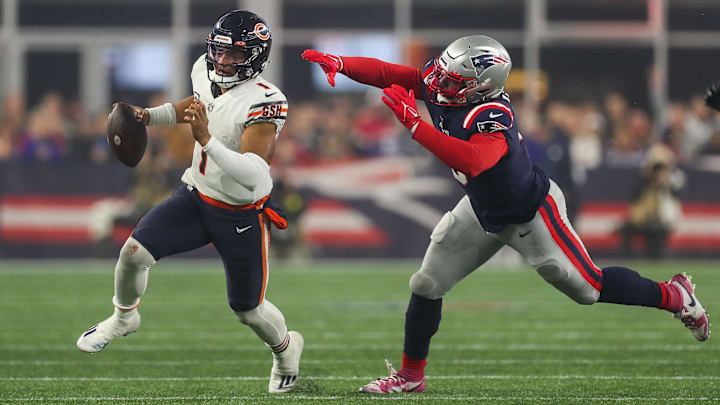John F. Kennedy once said, “Change is the law of life. And those who look only to the past or present are certain to miss the future”, so even he seems to be telling the Patriots to move on from Mac Jones. But with a new offensive coordinator, do they necessarily need a new quarterback?
According to several people, they should draft a new signal caller with their 3rd pick. But according to Chad Reuter of NFL.com, the Patriots should trade for Justin Fields. Reuter has the Patriots giving up their 2024 first-round and fourth-round pick, plus their first-rounder in 2015, AND a conditional pick.
But how does Fields compare to Jones?
Well, statistically speaking, they have played similar games in their respective NFL careers. Jones has played 42 regular season games for the Patriots (and a single playoff game), and Fields has played 40 regular season games in Chicago (no playoff games, though), making comparing their statistics quite relevant.
Jones has completed 66.1% of his passes, while Fields has a career completion percentage of just 60.3%. And you’d be hard to pressed to argue Jones has had a receiver of the caliber of D.J Moore while he’s been in New England. Not that they’re really a “QB statistic,” but Jones has a better win-loss record, too.
Jones has won 18 of his 42 games, or 43%. Fields’ winning percentage is just 25% of his 40 games after recording just the ten victories.
Fields does have a better touchdowns percentage, though, with 4.2% of his passes ending up in the endzone; Jones has only thrown scoring passes on 3.5% of his passes.
According to Pro Football Reference’s advanced passing statistics, the Bears receivers have dropped a higher percentage of Fields’ passes than their Patriots counterparts have for Jones. Fields has had to overcome a 5.2% drop rate compared to Jones’ 4.7%. But they also give Fields a worse "bad pass" rate than they bestow on Jones. 19.1% of Fields’ passes are classified as bad compared to 15.8% of Jones’.
In Fields’ defense, he has been subjected to more pressure than Jones has, and we know Jones has been under pressure in the pocket. Fields has dealt with pass rushers on 26.9% of his dropbacks in Chicago. That’s 7.8% worse than the rate of pressure Jones has been subjected to.
The significant difference between Jones and Fields comes when you compare their rushing numbers. Starting with their rushing attempts, Fields has run 356 times in his 38 starts (over nine times per game). Jones has tucked the ball and run 117 times in his 42 starts (fewer than three times per game). Fields averages 6.2 yards per attempt compared to Jones’ 2.8 yards.
Unsurprisingly, Fields has scored many more rushing touchdowns, too, 14 to 1!
In this particular scenario (the Patriots giving up three picks for one player), there’s no way the Patriots should even consider the trade. The Patriots aren’t one quarterback away from having the perfect team. And Fields’ contract ends at the end of the 2025 season; any rookie they take in the 2024 draft will be contracted until 2028.
Statistically, it would make sense to trade for Fields if the Patriots and Alex Van Pelt want a running quarterback. And the prospect of a Fields and Rhamondre Stevenson backfield is certainly intriguing. But that would mean rebuilding the offensive line and uncovering more wide receivers like Juju Smith-Schuster who can run block as well as they can catch passes.
Trading for Fields seems like a lot of work for a new coaching regime that already has a massive job on its hands. But just because it doesn’t make any sense doesn’t mean it won’t happen.
